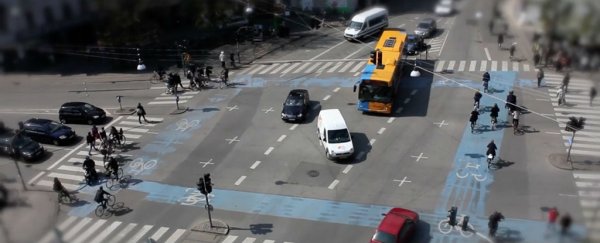You might not think much about it during your daily commute, but the timings of traffic lights play a big role in how quickly you get from A to B, and in the Danish capital of Copenhagen, authorities have shifted things in favour of buses and bicycles. Their new programmable, 'smart' traffic lights are now giving automatic priority to these more environmentally friendly modes of transport.
It's officially called the Intelligent Transport Systems Action Plan, and the aim is obvious: making your journey quicker if you're on public transport or a bike. If the local government can tempt more people out of their cars, they'll be well on their way to meeting their target of making Copenhagen a carbon-neutral city by 2025. All the installed lights will be connected to the Web, collecting and analysing data and feeding it back to a central dashboard.
An upgrade is well overdue too. The existing traffic lights have been in place for 35 years, and they're about to be replaced by 380 intelligent signals across the metropolis. It's part of a 47 million kroner (about US$7 million) overhaul that should benefit car passengers as well, because of smoother traffic flow – just not as much as bus travellers or cyclists.
Bus passengers should see a 5 to 20 percent reduction in their travel times, according to city officials, while cyclists can expect to complete their journeys 10 percent quicker, on average. What's more, Copenhagen buses are going to be reporting back their position to the main grid, so the lights know where each vehicle is and can make adjustments accordingly (if your bus is late, for example, the lights could help to speed it up).
The new technology is also going to improve the 'green waves' concept already in operation: it allows cyclists who maintain a steady speed of around 19 km/h (12 mph) to coast into the city without stopping, thanks to the timings of the lights. The upgraded hardware will include sensors to detect how many cyclists are approaching dedicated bike paths and make adjustments accordingly. If the weather worsens, meanwhile, the lights can account for slower cycling speeds.
"In short, these systems will ensure traffic that flows better so that as many people as possible can save time in the greenest possible way," mayor of the Traffic and Environmental Administration, Morten Kabell, told the press. "It means that Copenhageners won't waste time on their way to and from work and that is good business. Copenhagen will be a laboratory where we develop new solutions."
As yet there's no confirmed timescale for the technology to be fully installed and operational, but if you're heading to Denmark's capital in the near future, you might be better off borrowing a bicycle than renting a car.
